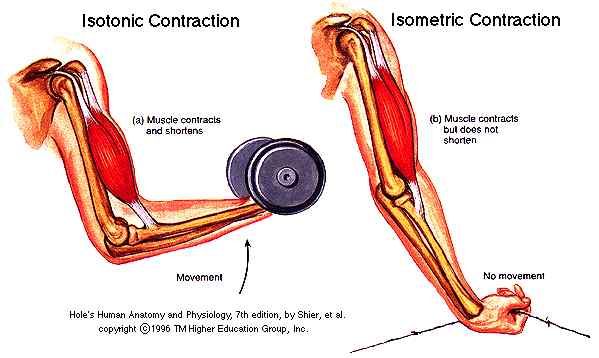
The distance between the origin and insertion becomes lessened. Define isotonic contraction muscle.

Isotonic contraction muscle synonyms isotonic contraction muscle pronunciation isotonic contraction muscle translation English dictionary definition of isotonic contraction muscle.
Isotonic muscle contraction definition. Physiology Of or involving muscular contraction in which the muscle remains under relatively constant tension while its length changes. Isotonic muscle contraction produces limb movement without a change in muscle tension whereas isometric muscle contraction produces muscle tension without a change in limb movement. Most physical activities involve a combination of both forms of.
Isotonic literally means same tension where iso-means the same and tonic refers to tension or force - in this case in the muscle. In an isotonic contraction. Isometric exercise is defined as muscle contraction without movement of the joint s crossed by the active muscle s.
The intensity of isometric contraction is usually expressed as a percentage of the maximum force of contraction. Isometric exercise elevates both heart rate and blood pressure. Is a type of muscle contraction in which the muscle shortens and thickens like when a person flexes the biceps muscle.
Isotonic Contraction is when the muscle shortens and thickens say as when flexing the biceps muscle. Isotonic contraction muscle contraction without appreciable change in the force of contraction. The distance between the origin and insertion becomes lessened.
Of or involving muscular contraction against resistance in which the length of the muscle changes. Isotonic movements are either concentric working muscle shortens or eccentric working muscle lengthens. Isotonic concentric contraction this involves the muscle shortening.
The origin and insertion of the muscle move closer together and the muscle becomes fatter. Isotonic eccentric contraction. A muscular contraction in which the length of the muscle changes.
An isotonic contraction where the muscle lengthens. An isotonic contraction where the muscle shortens. A muscle fiber generates tension through actin and myosin cross-bridge cycling.
Isotonic contractions are those where the muscle changes length as it contracts whilst the load or resistance remains the same. As a result this causes movement of a body part. There are two types of Isotonic contraction.
The isotonic contraction refers to the contraction in the muscle cells resulting in the alteration in muscle length. The tension in the muscle does not change in this process. This contraction can.
Isotonic - of or involving muscular contraction in which tension is constant while length changes physiology - the branch of the biological sciences dealing with the functioning of organisms isometric - of or involving muscular contraction in which tension increases while length remains constant. For a muscle contraction to be truly isotonic according to the definition it requires the same tension on the muscle throughout the movement. In real life workouts this is actually quite rare.
As an exercise is undertaken eg. Lifting a weight there is usually a slight fluctuation in speed as momentum shifts and joint angles and forces. Isotonic definition is - of relating to or being muscular contraction in the absence of significant resistance with marked shortening of muscle fibers and without great increase in muscle tone.
How to use isotonic in a sentence. Definition An isotonic muscle contraction occurs when the force or tension in the muscle remains constant while the length of the muscle changes. The change in muscle length is not constrained by a specific speed thus may move at any appropriate velocity.
There are two types of isotonic contractions in muscle movement. Concentric and eccentric. Isotonic is a term used to describe solutions and chemistry and sometimes muscles in human biology.
In chemistry a solution is said to be isotonic when it has the same concentration of solutes as another solution across a semipermeable membrane. The use of isotonic in human anatomy is used more rarely. However it describes muscles that have the same.
Define isotonic contraction muscle. Isotonic contraction muscle synonyms isotonic contraction muscle pronunciation isotonic contraction muscle translation English dictionary definition of isotonic contraction muscle. Organ that produces movement Not to be confused with.
Mussel a bivalve mollusk or clam Abused Confused Misused Words by Mary. An isotonic contraction can be defined as the shortening or lengthening of a muscle against a constant tonusload. In other words the length of the muscle changes but the load remains the same.
If you are interested an isotonic also called dynamic stretching routine can be found here which will fit perfectly as a warm up. In anatomy isotonic is a condition of muscle contraction wherein the length of the muscle decreases under constant tension. Isotonic solutions are the solutions with the same tonicity.
The measure of relative solute concentration across a semipermeable membrane is known as tonicity. Isotonic Contraction Mechanics. Two types of protein in your muscles actin and myosin contribute to the basic mechanisms of isotonic contraction.
During this type of contraction thick strands of myosin and thin strands of actin slide over each other producing shortening in each individual muscle cell and the muscle as a whole. Related to isotonic muscle contraction. Isometric muscle contraction CONTRACTION.
A mode of writing or printing by which some of the letters of a word are omitted. Tension force or contraction developed by the muscle remains almost constant while the muscle change its length. The muscle shortens and pulls on another structure such s a tendon to produce movement ex.
Picking up a book. Tap card to see definition.